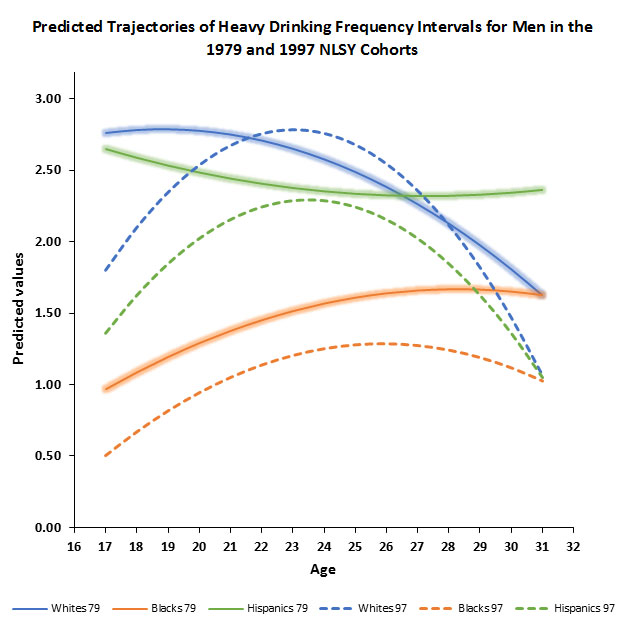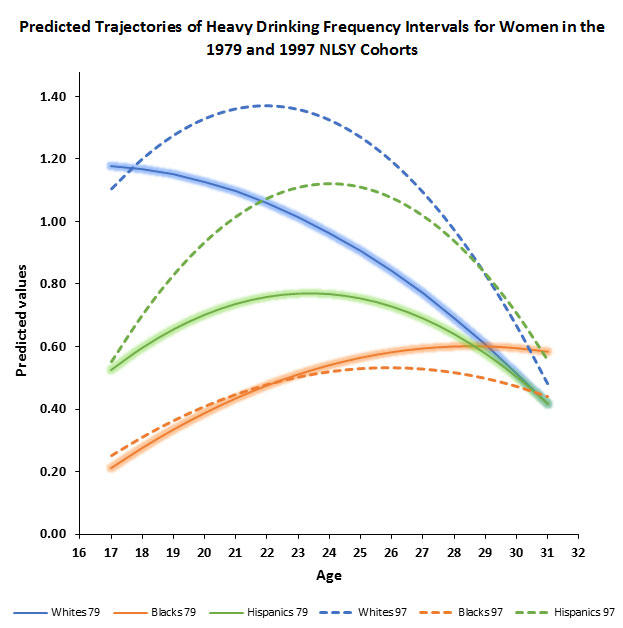According to a study from ARG Research Associate, Edwina Williams, MPH, and colleagues, when comparing heavy drinking trajectories between two cohorts, trajectories for Hispanics and Whites of both sexes have changed over time. However, Hispanic and White women in the younger cohort saw the greatest increase in heavy drinking compared to other groups.
Data from the 1979 and 1997 cohorts of the National Longitudinal Survey of Youth were used to model heavy drinking frequency from ages 17-31. It is the first known study to look at racial/ethnic-sex differences in heavy drinking trajectories between two cohorts.
“What we found suggests that women’s drinking has changed significantly compared to the older cohort of women, and a narrowing gap between young men’s and women’s drinking,” ARG Research Associate and lead author Edwina Williams said. “It also suggests that women think differently about drinking and are behaving differently than their older counterparts. These changes could result in greater health problems for women over time if this drinking pattern persists or gets worse.”
Results also showed that the younger cohort’s heavy drinking peaked in the mid-twenties compared to the older cohort who peaked in their late teens or late twenties. However, the peak frequency remained the same.
“While such a shift in heavy drinking may help reduce alcohol-related morbidity and mortality in late adolescence, we’re concerned that young adults are drinking more frequently than they used to,” she added.
With heavy drinking peak frequency largely unchanged and young women engaging in heavy drinking more often than the previous generation, Williams and colleagues call for more preventative approaches that will help reduce alcohol use in young people overall.
“If we want to see heavy drinking drop, interventions that target specific groups are needed along with research that focuses on racial/ethnic and sex disparities. Only then can we ensure that prevention efforts will be appropriate and effective.”
The study was funded by the National Institute on Alcohol Abuse and Alcoholism and is available online October 31, 2017 in the journal Alcoholism: Clinical and Experimental Research. Other Alcohol Research Group co-authors included Nina Mulia, Katherine J. Karriker-Jaffe, and Camillia Lui.
***
Williams, E., Mulia, N., Karriker-Jaffe, K.J., Lui, C. (2017). Changing racial/ethnic disparities in heavy drinking trajectories through young adulthood: a comparative cohort study. Alcoholism: Clinical and Experimental Research: https://onlinelibrary.wiley.com/doi/10.1111/acer.13541/full
Research reported here was supported by the U.S. National Institute on Alcohol Abuse and Alcoholism (NIAAA) of the National Institutes of Health under award number R01AA022668, PI Mulia and P50AA005595, PI Kerr. The content is solely the responsibility of the authors and does not necessarily represent the official views of NIAAA or the National Institutes of Health.
If you are interested in arranging an interview with Edwina Williams, MPH, please contact Diane Schmidt, communications specialist at the Alcohol Research Group at (510) 898- 5819 or dschmidt@arg.org.









